ENGLISH PAGES

“ LET IT BE KNOWN
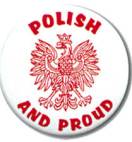
TO THE FOREIGN THRONG
THAT POLES ARE NOT GEESE,
AND SPEAK
THEIR OWN TONGUE”
Mikołaj (Nicholas) Rey
POLAND THROUGH THE AGES
Warsaw Uprising 1944
The Warsaw Uprising 1944 was a heroic, unique and tragic 63-day struggle (August – October 1944) to liberate Warsaw – capital of Poland – from German occupation. Undertaken by the Home Army (Armia Krajowa, AK), the Polish resistance group.
At that time Allied troops were breaking through the Normandy defences and the Red Army was standing at the line of the Vistula River, near Warsaw.
Warsaw could have been the first European capital liberated; however, various military and political miscalculations, as well as global politics – played among Joseph Stalin, Winston Churchill and Franklin D. Roosevelt – turned the dice against it. Warsaw’s insurgents estimated at 50.000 Polish soldiers of Home Army (AK), 4.000 women included, have enough weapons only for 2.500 fighters. They were facing a 55.000-strong brutal German garrison, armed with tanks, planes, and artillery. Nevertheless Polish insurgents were fighting for their capital for 63 days.
Warsaw paid a high price: 16.000-18.000 insurgents were killed and about 26.000 were wounded. About 150.000 civilians were killed during fight or murdered by German troops. Warsaw was completely destroyed. All civilians were forced to leave the city. Approximately 50.000 civilians ended up in the concentration camps as „dangerous elements”, and an additional 150.000 were transported to forced labour camps in Germany.
We Remember Them!!!
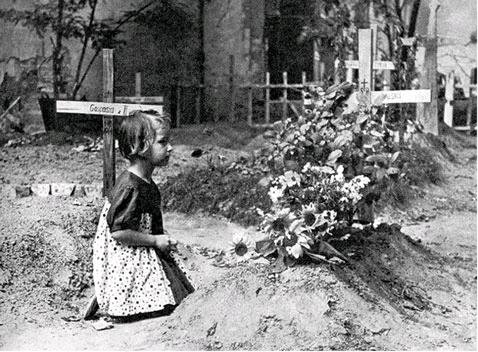
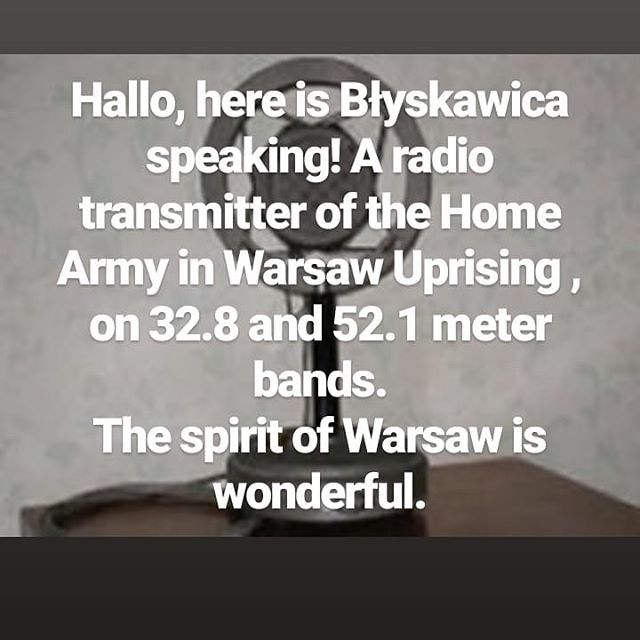
The Błyskawica radiostation („Lightning” radiostation) was an insurgent radio transmitter broadcasting from Warsaw during the Warsaw Uprising of 1944, since 8 August 1944 until the end of the struggle.The transmitter was constructed by Antoni Zębik pseudonym „Biegły”. Itssignal was the melody of Warszawianka. Initially, the radio station was placed in the building of PKO (Pocztowa Kasa Oszczędności, Engl.: Postal Savings Bank) in Jasna 9 street. On 25 August it was moved to the „Adria” cafe in Moniuszki 10 street. On 4 September it was relocated to the building of the former USSR embassy in Poznańska 15 street and then to the Public Library in Koszykowa 26 street. The chief of the team was Stanisław Zadrożny pseudonym „Pawlicz”. His deputy was Zofia Rutkowska pseudonym „Ewa”, who assumed the care of the performance of the program. Jan Nowak-Jeziorański together with an RAFairman John Ward conducted English-language broadcasts. Zbigniew Świętochowski pseudonym „Krzysztof”, Stefan Sojecki, Zbigniew Jasiński and Mieczysław Ubysz worked as speakers. News and reportages were carried by Jacek Wołowski.
The first words broadcast by this radiostation, spoken by Zbigniew Świętochowski, were as following: Hallo, here is Błyskawica speaking! A radio transmitter of the Home Army in Warsaw, on 32.8 and 52.1 meter bands. The spirit of Warsaw is wonderful.The women of Warsaw are wonderful. They are everywhere, in the front line together with soldiers as nurses or liaison officers. Even children are animated by a wonderful spirit of bravery. We greet all freedom-loving people of the world! Polish soldiers who fight in Italy, Polish pilots and mariners.” The radio broadcast also on the medium wave a subversive program addressed to Wehrmacht soldiers, as part of the „N” Action. On 4 October, when the uprising was drawing near the end, it broadcast the last, 10-minute long, message. After this transmission, the radiostation was destroyed by the then chief of the team Jan Georgica pseudonym „Grzegorzewicz
***
Krwią i rymem / With Blood and Poetic Verse – Andrzej Miłosz’
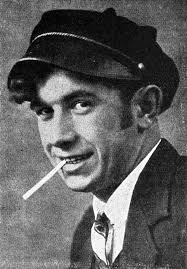
A portrait of Zbigniew Jasiński, a prominent poet of the Warsaw Uprising. Born in 1908, he was a sailor, journalist and poet. He worked in the Maritime Institute in Gdańsk. He fought in the 1939 September Campaign. Taken prisoner by the Soviets, he was transported to a labour camp near Kursk. Following the German-Soviet agreement on the exchange of POWs, he was brought to Lublin. He managed to escape in 1940. A year later he joined the Home Army. In 1943 he was a sent to Yugoslavia on a courier mission.
During the Warsaw Uprising in 1944 he served as a press correspondent. His poems are renowned for their fervour and expressive power. He made his name with the poem ‘We demand ammunition’, which was aired by the clandestine radio station ‘Błyskawica’ (Lightning) on 24 August.
Here no one cries in Fighting Warsaw.
Here we have wolves’ teeth and tilted caps,
Why do you keep playing a mourful chorale in London,
And we are bare-breasted against the cannon-fire.
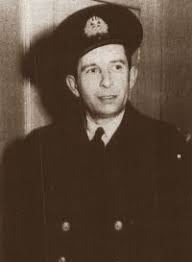
When the long-awaited celebration has finally come!
The girls fight arm-in-arm with their boys,
And little children fight, and the blood cheerfully flows.
Hello! Here’s the heart of Poland Polski! This is Warsaw calling!
Stop playing funeral songs in your broadcasts!
We have enough spirit for us and for you!
We need no applause! We demand ammunition!
***
After the defeat of the Warsaw Uprising, Jasiński was taken to the POW camp in Sandbostel. In 1952 he settled in Australia, where he died in 1984.
Krztusi się radio, w depeszach brak tchu niecierpliwym słowom.
Dym wplata motywy czarne, kurze białe, a krew czerwone
w koncert ulic i placów. Jak werble żołnierskiej stopy
na Świętokrzyskiej, Królewskiej, na Długiej i Żoliborzu.
Tego koncertu nie nagrasz
na żadną płytę,
płyta od gniewu pęknie,
melodii odpowie zgrzytem.. .
Jerzy Pietrkiewicz
***
Author: Antoni J. Jasinski
###################

ENGLISH PAGES !?
That’s a really good idea!
Congratulations On Your (and naszepismo) Achievement!
Pass it forward !
Regardas
Stan Mazurek,
Devonport
If you’d visited Warsaw in 1945, you might not have recognized it as a city at all. Destroyed by the Germans in retribution for a 1944 uprising, the city was pocked by craters and reduced to miles and miles of rubble. It wasn’t just the capital!
Much of Poland was rubble by the end of the war!
Germany owes Poland over $850 billion in WW2 reparations -for damages it incurred during World War Two and the brutal occupation!
Six million Poles, including three million Polish Jews, were killed during the war and Warsaw was razed to the ground following a 1944 uprising in which about 200,000 civilians died.
Poland lost not only millions of its citizens but it was also destroyed in an unusually brutal way.!
Mrs (Frau) Merkel! WE NEED THE MONEY NOW!!!
WE REMEMBER!
JAN
THE SON OF WARSAW RISES